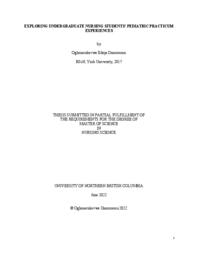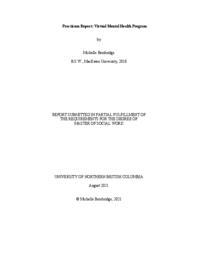Alschech, Jonathan
Person Preferred Name
Jonathan Alschech
Related Works
Content type
Digital Document
Description / Synopsis
Practicum placements are the signature method used in undergraduate nursing programs to consolidate knowledge in practice. The literature review conducted before this study showed limited research on pediatric practices in undergraduate nursing education. This qualitative descriptive study, analyzed within Knowles’ (1977) adult learning theory framework, explored the practicum experiences of nursing students and the value they ascribed to their learning experience. The acute and community pediatric practicum experiences of 13 undergraduate nursing students and two recent graduates in British Columbia were explored using semi-structured interviews. Thematic analysis of interview data generated four overarching themes: relational practice, knowledge consolidation, identity formation, and exposure. Findings from the study indicated that nursing students valued pediatric placement opportunities that provided a variety of learning experiences and allowed them to work within their perceived scope. Information from this study can inform the planning and management of pediatric practicum experiences for nursing students in undergraduate nursing programs.
Origin Information
Content type
Digital Document
Description / Synopsis
People who reside in rural areas are faced with ongoing barriers to accessing mental health services. A number of aspects of rural life such as the rural community, social networks, and limited access to service all have particular implications for people experiencing mental health issues. Additional issues such as the effect of rural culture on help-seeking for mental illness, the lack of anonymity in small communities and the difficulty to maintain confidence, and mental health and addictions stigma may further impact the recognition, treatment, and maintenance of mental health problems for people in rural and remote locations. Providing mental health services to residents in these places requires creative and flexible service delivery options. This practicum report details my experience with the Virtual Mental Health Program at Alberta Health Services and highlights the role that social workers play in delivering mental health services in underserved locations as well as the potentials for further developing these services.
Origin Information
Content type
Digital Document
Description / Synopsis
Background. Adolescents are losing the opportunity to observe and practice food skills since diets are shifting from home prepared meals made from basic ingredients to a diet comprised of ultra-processed foods, resulting in reduced consumption of minimally processed foods such as fruits and vegetables. Evidence suggests that engaging in food preparation during adolescence is associated with ongoing healthy dietary behaviours and food preparation practices into adulthood, thus developing food preparation skills in adolescence may help better support individuals to make health informed food choices. Food literacy represents the interdependent concepts related to the facets influencing dietary practices. The objective of the current study was to examine the association between food literacy and fruit and vegetable consumption (FVC) among Canadian adolescents. Methods. Guided by the food literacy framework developed by Thomas et al. (2019), a secondary analysis was conducted on the Canadian Community Health Survey, Rapid Response on Food Skills (Part 2) – mechanical skills and food conceptualization. The sample population (N=790) included all survey respondents aged 12- 17 years who responded to the survey questions that built the outcome variable: total daily fruit and vegetable consumption. Results. When compared to respondents who report low levels of food skill, respondents who reported high food skill levels in the ability to cook from basic ingredients (OR 1.84, 95% CI 1.12-3.02), freeze vegetables from raw (OR 1.50, 95% CI 1.00-2.24), and to adjust a recipe to make it healthier (OR 3.02, 95% CI 1.29-3.26) were more likely to consume fruits and vegetables five or more times a day. Respondents who came from households where the highest level of household educational attainment was trades had lower odds of consuming fruits and vegetables five or more times a day compared to households where the highest level of educational attainment was a bachelor’s degree or higher (OR 0.34, 95% CI 0.14-0.81). Within the logistic regression model, significant relationships were found between FVC and a respondent’s sex (p=0.04), perceived eating habits (p<0.001), and highest level of household educational attainment (p=0.02). Discussion. Significant relationships between FVC and food literacy were evident in food skills that were multifaceted, requiring that adolescents have the ability to perform a number of basic food skills and reflective of several food literacy attributes. The relationships found between multifaceted food skills and adolescent FVC suggest that food literacy attributes are interconnected and have reciprocal relationships. Conclusion. Dietary behaviours are influenced by multiple factors. Study findings suggest that higher levels of adolescent food literacy, as reflected in multifaceted food skills, have the potential to positively impact their FVC. However, when societal factors are controlled for, food skills were not found to have a significant relationship with adolescent FVC, suggesting that factors outside of the control of the individual have the potential to minimize the influence of individual food literacy characteristics on adolescent FVC. Future food literacy programs should be inclusive of adolescents from all SES and should aim to teach and evaluate food literacy attributes that build more complex food skills.
Origin Information
Content type
Digital Document
Description / Synopsis
The thesis investigated how conflicting gender ideologies influenced Nigerian-immigrant women's experiences of domestic violence in Canada. Nigeria, the participants' country of heritage, practices patriarchal social stratification while Canada, the country of current residence, has egalitarian structures. Using a qualitative research orientation and non-probability purposive snowballing sampling procedures with ten (10) Nigerian immigrant women to Canada, data collection procedures involved electronic phone interviews. The data analysis process involved transcription, categorization, coding, and theme generation by the researcher. The nine major themes identified that the study participants experiences a change or shift in gender ideologies towards more egalitarian ideologies while some of their partners did not experience the same change, thereby resulting in conflicting gender ideologies that influenced their experiences of domestic violence. The thesis concluded with recommendations for culturally sensitive services that combat domestic violence, and ease adjustment into Canadian communities for the study participants and immigrant women in general.
Origin Information




